By the time you’re halfway between Mobile and Panama City Beach, deep into the flat, pine-lined corridors of the Gulf Coast, it hits you: this is no ordinary road trip. You’re piloting a steel-plated wedge of the future with a tow hitch, towing 7,000 pounds of family vacation real estate, and drawing as many stares as a ’69 Charger at Cars & Coffee.
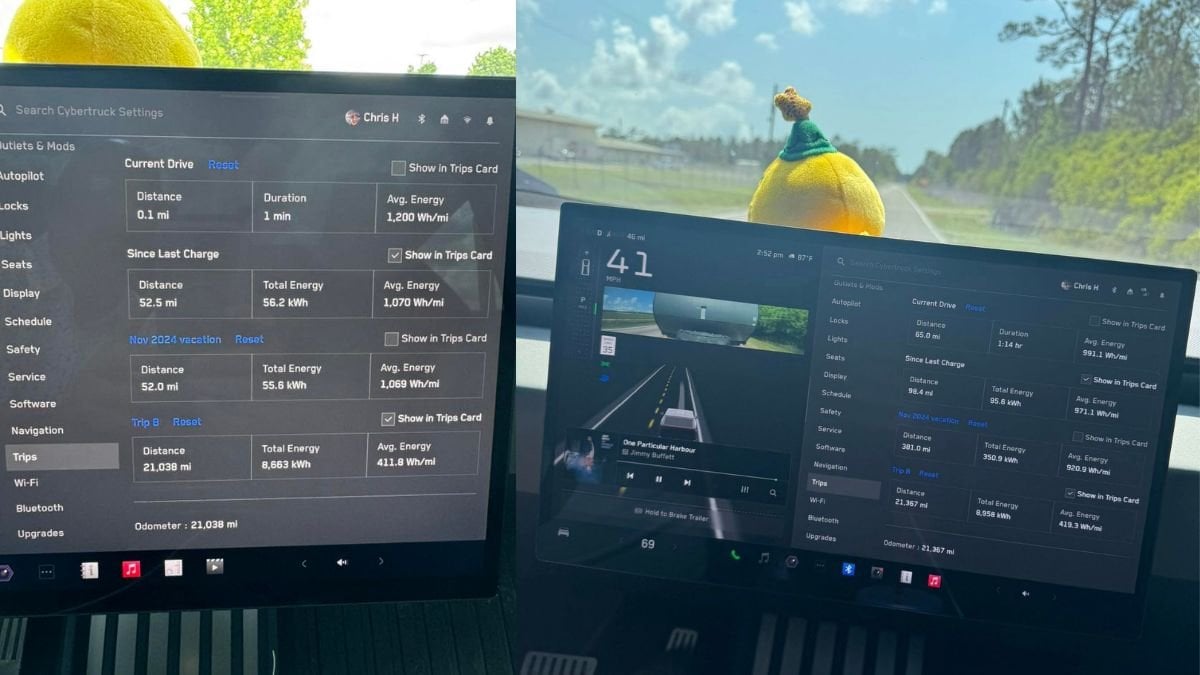
This is the Tesla Cybertruck in its element, or perhaps more accurately, redefining what that element even means. This isn’t about convenience, it’s about capability, precision, and the very real progress of electric trucks stepping into the hard-working shoes of their gas-guzzling ancestors.
Staying Connected & Utilizing Starlink Mini on the Road
Chris Helton, a member of the Cybertruck Owners Only Facebook group, shared his real-world towing report card:
“Warning, this is a long post on towing our camper with my Cybertruck, hopefully passing along some helpful info - cross-posted.
Truck
- 2024 Foundation AWD
- Received 8/24
- 21,300 miles
- Factory All Terrain 35’s
- Previously towed with my 2014 Titan
Camper
- 2020 Coachman Catalina Legacy 243RBS (about 28’ long)
- Tandem axle
- 6,800-7,000 lbs this haul
- Heavy Hauler hitch & anti-sway kit
Trip
- South Mobile County to Panama City
- 381 miles round trip
- ~ 1/2 interstate, 1/2 town/highway
- Total energy used - 350.9 KWh
- Average consumption on interstate @70mph ~1,070 Wh/mi
- Average consumption in town/highway traffic, 35-55 mph, was ~ 780 Wh/mi. Partial heavy beach traffic, stop and go
- Temperature was 75-90 degrees F
- Terrain is relatively flat except for bridges
- Started each way with 300 “miles” of charge
- Charged twice going there, so I could arrive with >25% ~ 35 minutes each
- Charged once coming home for 1 hour (37% to 100%), arrived home with 14%
Tips and comments
- My camper’s cameras (wirelessly fed to a dash monitor) are powered by the camper's lighting circuit, so truck lights must be on. I had to turn off auto and put on parking lights after shifting into “gear,” or it reverts back to auto
- Look for chargers in advance that are open on the backside, like BelAir Mall in Mobile, so you don’t have to drop the camper or block stalls. Otherwise, it’s not bad. I look for a large parking lot (Lowe’s or Walmart), and it takes about 10 minutes to drop off, then 10 to pick up after charging
- Be prepared for a lot of vehicles pulling up alongside to take pictures or videos
- I turned off the auto mirror tilt on my side mirrors, which helps tremendously when backing up
Advertising - The Cybertruck’s stock mirrors and cameras worked remarkably well, the turn signal cameras provided excellent views while navigating turns and curbs
- This is the best truck I have ever had for aligning the hitch, with the rear camera and all-wheel steering, first time every time without getting out
- I have a Starlink mini mounted on my Cybertruck roof and used it for the trip. It worked great, except under heavy cover at our specific site, it still worked well enough to stream with little buffering. Moved it outside the cover and was getting 150+ Mb/s
- I used ~ “35” miles of power a day for my Starlink and Sentry while parked
- The Mini was plugged into my truck’s outlet, so being able to turn the outlets back on after 12 hours from your app is a plus
- I upgraded my electric tongue jack to 3,750 lbs instead of the standard 1,500-lb. jack to help ensure it was able to lift the rear of my truck up when installing the anti-sway braces. I’m sure I could try some funky stuff on raising my truck height, but with the added weight of the camper, I don’t want to take a chance on damaging my truck’s air system
Overall, towing with my Cybertruck was a great experience, it always had the power to pass vehicles or climb bridges. It held the road well, being heavy enough not to really feel a “push” when I was passed by semi trucks or by Gulf winds across coastal bridges. I do wish we had some sort of cruise control while towing; that would be helpful.
Stopping every ~ 100 or so miles to charge isn’t great if you are in a rush, but a solid plan around stops makes it workable, and as the charging infrastructure for towing vehicles increases, I see it only getting better…. I’ll try to answer any specific questions you may have as I can..”
It’s not a tale of struggle, it’s one of adaptation. Range does dip under load, yes, but the takeaway isn’t about loss. It’s about control, precision, and the surprisingly smooth performance of the Cybertruck when asked to tow something substantial across a variety of conditions. The numbers don’t lie, but neither does the ease of the experience once you plan your route.
Cybertruck Towing Performance: Real-World Range and Efficiency
- The Cybertruck's dual-motor and tri-motor models can tow up to 11,000 pounds, placing it among the top performers in the electric pickup category.
- Real-world tests indicate that towing significantly reduces the Cybertruck's range. For instance, hauling a 6,000-pound trailer can decrease the range by approximately 50%, bringing it down to around 160 miles per charge.
- The Cybertruck features a 2-inch hitch receiver compatible with various ball mounts and includes a towing interface that allows for trailer brake gain adjustments via the central touchscreen or steering wheel controls.
What might surprise many is just how stable and confident the truck feels under load. Helton praised the precision of the all-wheel steering and the utility of the hitch alignment cameras:
“First time, every time, without getting out,”
He wrote. That’s a trucker’s dream, and it’s no exaggeration. The rear-steer and ultra-wide camera system delivers a towing experience that feels less like wrestling a bull and more like guiding a train on tracks. Even with heavy Gulf winds sweeping across the bridges, the truck held its line. No sway, no drama.
And that brings us to one of the more interesting discoveries: the anti-sway kit. A few users chimed in on the post, curious about how the Cybertruck’s air suspension would handle a traditional weight-distribution setup.
As Helton confirmed, his upgraded electric tongue jack helped with setup, and others like Riley Bowers recommended using the truck’s own suspension to make hitching a smoother, safer process. It’s a marriage of old-school towing tricks and cutting-edge suspension tech, and the Cybertruck handles it with maturity.
Stability and Control: Anti-Sway Kit Enhancements For The Cybertruck
Helton also made clever use of a Starlink Mini mounted to the truck's roof, staying connected throughout the trip. Even under tree cover, he was pulling over 150 Mbps when repositioned.
He used around 35 miles of charge daily to power Starlink and Sentry mode while parked, features that, while not necessary, make the Cybertruck more than just a tow vehicle. It becomes a mobile command center, a tech hub for the nomadic camper who wants comfort and connectivity without compromise.
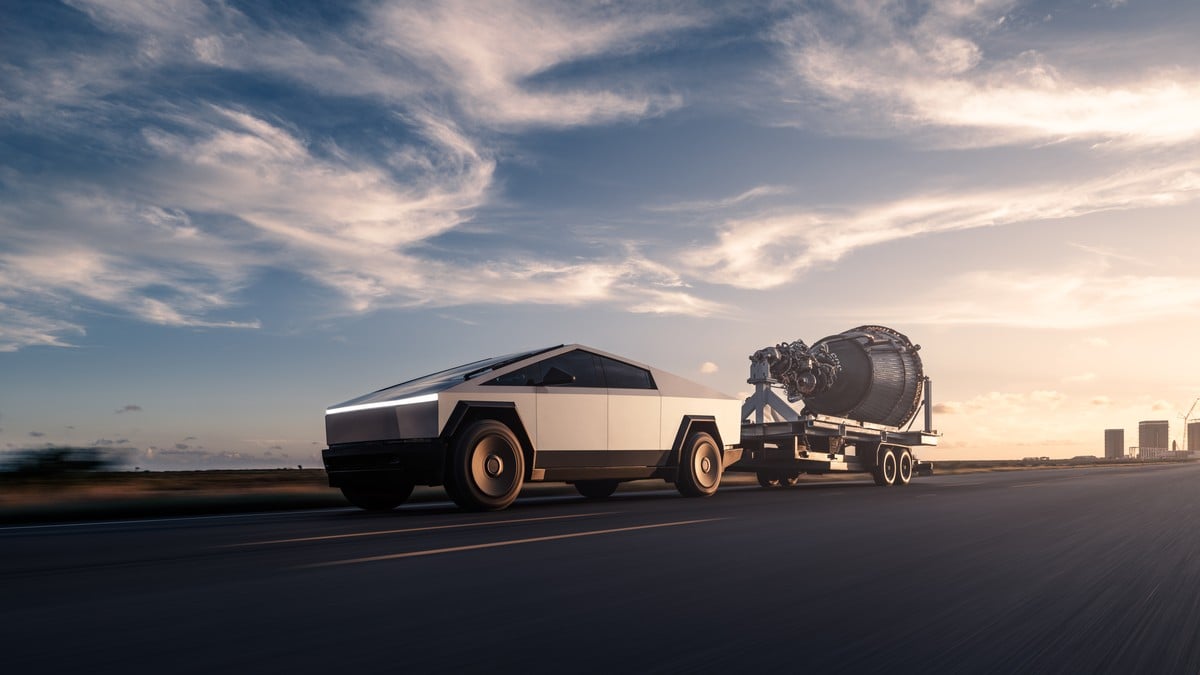
Yes, planning your charging stops is part of the experience, but it’s not a chore if you know what you’re doing.
“Look for chargers in advance that are open on the backside.”
Helton advises, pointing to the BelAir Mall in Mobile as a perfect example. Drop the trailer, charge up, and roll out. Ten minutes to disconnect, ten to reconnect. For seasoned RVers, that’s a coffee break. With more EV infrastructure coming online every day, especially in travel-friendly retail hubs, this will only get easier.
Performance? There’s no shortage. Helton noted,
“It always had the power to pass vehicles or climb bridges.”
And that speaks to the electric drivetrain’s biggest advantage, torque. Instant, silent, consistent. No gear hunting, no roar of downshifts. Just pure, unwavering pull. And while full self-driving and cruise control are understandably disabled when towing (for now), the visibility and camera angles Tesla built in do more than compensate.
“The turn signal cameras provided excellent views while navigating turns and curbs.”
Helton said, and that’s not just useful, it’s reassuring.
At the end of the day, this wasn’t a stress test. It was a confirmation. The Cybertruck might be wrapped in polarizing angles and Silicon Valley hype, but it’s learning to play by the rules of the road, and doing it well.
Cybertruck's Towing Capabilities Unveiled
- Charging the Cybertruck while towing can be challenging due to the scarcity of pull-through Supercharger stations. Most charging stations are designed for vehicles without trailers, requiring drivers to unhitch their trailers to charge. This process can be inconvenient and time-consuming, especially if the trailer is heavy or difficult to maneuver.
- Towing a trailer substantially decreases the Cybertruck's driving range. For instance, towing a 6,000-pound trailer can reduce the range by approximately 50%, bringing it down to around 160 miles per charge. This necessitates more frequent charging stops, which can be further complicated by the limited availability of suitable charging stations for towing setups.
- The Cybertruck is equipped with Tesla's Powershare feature, allowing it to supply power to external devices or even other electric vehicles. It includes multiple outlets, such as a 240V outlet in the cargo bed, enabling the Cybertruck to charge another EV while on the move. However, using this feature while towing can further reduce the Cybertruck's own range, making it more suitable for short-distance assistance rather than long-haul towing scenarios.
Sure, the range dips when you tow, but so does a gas truck’s fuel economy. What matters is how the Cybertruck handles the job, and by Helton’s account, it handles it with competence, confidence, and even a little flair. Towing might not yet be turnkey in the EV world, but the Cybertruck proves it’s not just possible, it’s already pretty darn good.
Have you tried towing with your Cybertruck?
How did it go, and are you happy with your purchase?
Let us know in the comments below.
Image Sources: Tesla Newsroom
Noah Washington is an automotive journalist based in Atlanta, Georgia. He enjoys covering the latest news in the automotive industry and conducting reviews on the latest cars. He has been in the automotive industry since 15 years old and has been featured in prominent automotive news sites. You can reach him on X and LinkedIn for tips and to follow his automotive coverage.


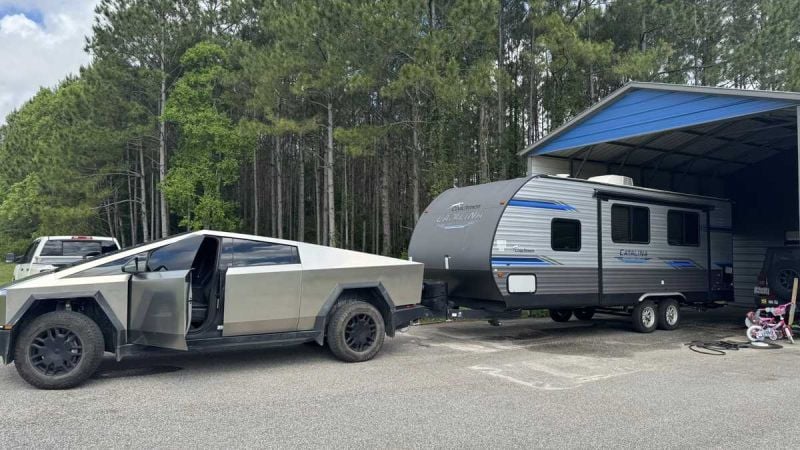






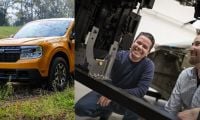
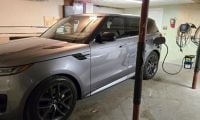

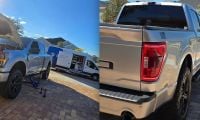
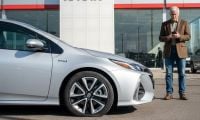
Comments
But the cybertoy won't be…
Permalink
But the cybertoy won't be produced after 2026, so what's the point, right?
Unhooking your trailer just…
Permalink
Unhooking your trailer just to fuel up? Who does that, right?
Wondwr what the haters have…
Permalink
Wondwr what the haters have to say about this amazing truck towing a camper
Lick more boot retard
Permalink
In reply to Wondwr what the haters have… by Andrew (not verified)
Lick more boot retard
idk
Permalink
In reply to Wondwr what the haters have… by Andrew (not verified)
idk
As someone who pulls a…
Permalink
In reply to Wondwr what the haters have… by Andrew (not verified)
As someone who pulls a camper A LOT, using a diesel, this sounds miserable. Most decent sized SUVs and trucks can pull 6k loaded (stopping safely is usually more of an issue). So I would expect a vehicle that size having no problems. But having to stop twice for 35 minutes, find a place to park your camper nearby, unhitch, charge, and then hitch back up again?!? No thanks. I can get 300+ miles on one tank through the mountains pulling 9.5k. And this was on flat coastal roads. I understand that towing is probably not the norm here and this is more "my CT can also do this when called upon", but the capacity and performance is just not there yet with EVs to make it practical without a lot of inconveniences and concessions. And this article does not make me feel better that it is any closer.
Glad to hear it worked out…
Permalink
Glad to hear it worked out for you. I thought it was bad etiquette to charge to 100% at a charging station?... doesn't the last 15% take a while?
Yeah, charging to 100% can…
Permalink
In reply to Glad to hear it worked out… by El Toro Blanco (not verified)
Yeah, charging to 100% can take longer, especially toward the end.
I don’t care if it a can…
Permalink
I don’t care if it a can pull a skyscraper, I would never purchase one. Not only are they the most ugliest thing I have ever seen with wheels.Even if someone came up to me here is the keys to your new Tesla. I would give the keys back and y no thank you.
get that
Permalink
In reply to I don’t care if it a can… by Maryann LaMagra (not verified)
get that
So...he drove 381 miles on…
Permalink
So...he drove 381 miles on 350kwh of power, for an average of 1.08mi/kwh.
Optimistically assuming $0.40/kwh for fast charging, that's $140 in EV "fuel".
If he got 10 mpg in an ICE pickup towing that load, that would be 38 gallons.
Let's optimistically say $3.00/gallon... That's $114 for ICE fuel.
I know trips like this are like 5% of trips. He probably still saves a lot on his regular daily driving...but I feel like public charging -especially fast charging- is gouging consumers.
Yeah, the cost for fast…
Permalink
In reply to So...he drove 381 miles on… by Eric (not verified)
Yeah, the cost for fast charging definitely adds up, and it’s not as cheap as some people think.
Stopping to charge every 100…
Permalink
Stopping to charge every 100 miles is wildly ridiculous in my opinion
Yeah, that’s definitely a…
Permalink
In reply to Stopping to charge every 100… by Nick B (not verified)
Yeah, that’s definitely a hassle
I tow my 27 foot trailer to…
Permalink
I tow my 27 foot trailer to Montana from Southern California once a year with my 1988 Ford F350. 2000 mi round trip. It's not an adventure, just a drive. Why in the world would I want a 100k shiny door stop that may or may not make the trip (adventure?)? Don't get it.
reliable and straightforward…
Permalink
In reply to I tow my 27 foot trailer to… by Bruce (not verified)
reliable and straightforward beats dealing with the unknown any day, especially for a long trip like that.
If you want to be involved…
Permalink
If you want to be involved with the experiment that is the cyber truck, that is surely your prerogative and more power to you. But for the cost of a cyber truck, you could easily have bought a regular EV car for your daily driver and a good used truck that tows 10,000 pounds. And then you wouldn’t have to stop the absolutely ridiculous amount of every hundred miles. It’s clear the cyber truck is nothing but an experiment right now. It’s worse than a EV car and worse than combustion engine truck. It offers zero for any buyer outside of pure curiosity.
Yeah, the Cybertruck…
Permalink
In reply to If you want to be involved… by Brett (not verified)
Yeah, the Cybertruck definitely feels like more of a test run than a practical vehicle right now
My issue with the vehicle is…
Permalink
In reply to If you want to be involved… by Brett (not verified)
My issue with the vehicle is it being called a truck, there are plenty of vehicles that can tow serious weight that are not trucks, I feel this is more of a cyber-ute, as with traditional car truck crossovers the bed is connected to the body and unable to remove without fabrication as a true truck can have an option of truck bed styles installed, where to do it with this vehicle your limit what fits in the bed and ifs it's large like a tow truck attachment someone already did, which leaves the vehicle unable to use it tonneau cover. And the modified cyber tow trucks can pull but looks like they're ready to bottom out unless they use skates with it. Every vehicle has its up and downs, some worse than others for me the vehicles technology is interesting but it's shape isn't that appealing to most.
I have the same camper, it's…
Permalink
I have the same camper, it's actual weight is just under 6000 lbs . Not 7 k..even with supplies loaded , maybe 6300.
All cybertruck owners should…
Permalink
All cybertruck owners should be bullied, even though as masochist, they'll enjoy it.
But thanks for letting us know you're a fascist.
I hope TSLA is paying you…
Permalink
I hope TSLA is paying you well and your not just writing this for blind cultist activity.